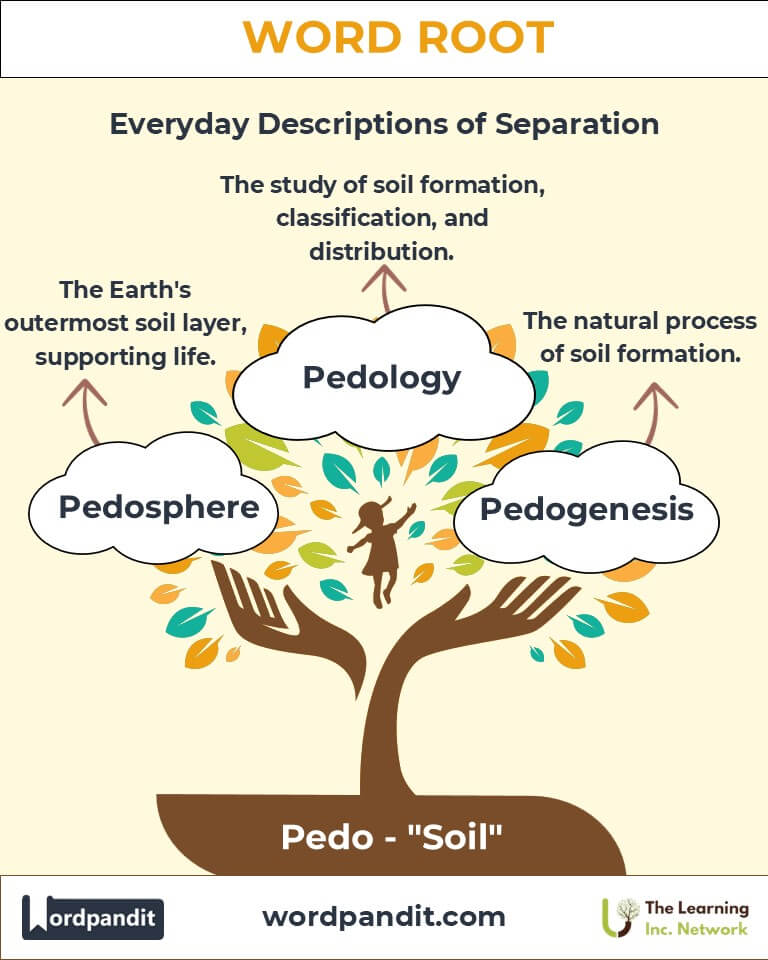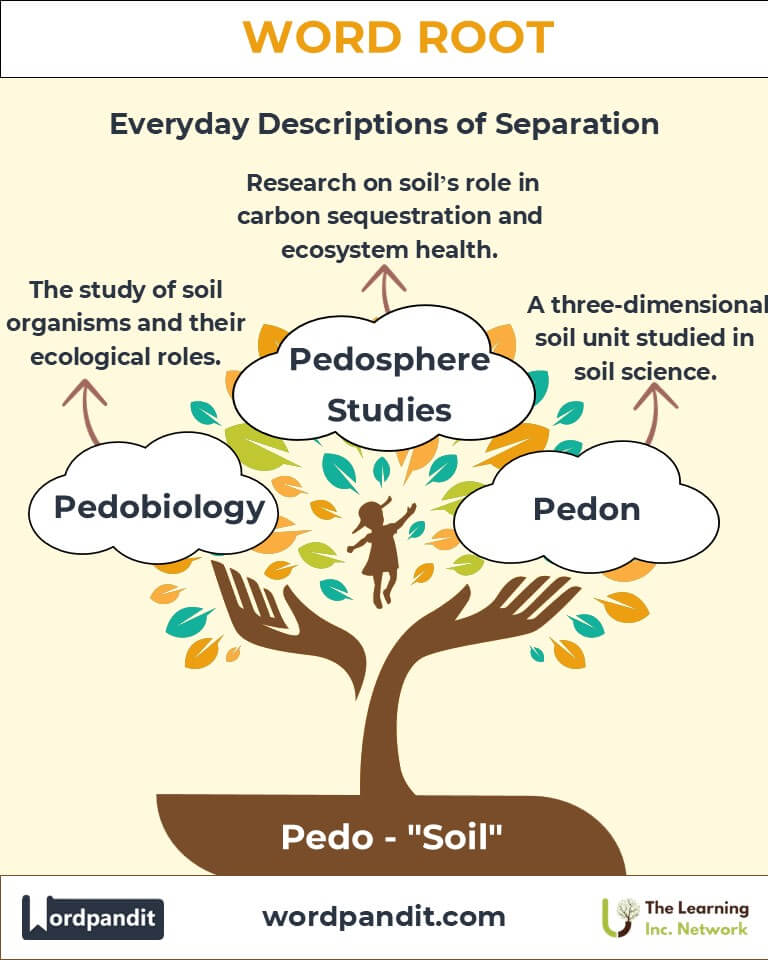Pedo: The Root of Soil and Its Secrets
Discover the fascinating world of the root "Pedo," derived from the Greek word meaning "soil." From scientific studies like pedology to natural processes like pedogenesis, this root plays a pivotal role in understanding Earth's foundational element—soil.

Table of Contents
- Introduction: The Essence of "Pedo"
- Etymology and Historical Journey
- Mnemonic: Unlocking the Power of Pedo
- Common "Pedo"-Related Terms
- "Pedo" Through Time
- "Pedo" in Specialized Fields
- Illustrative Story: "Pedo" in Action
- Cultural Significance of the "Pedo" Root
- The "Pedo" Family Tree
- FAQs About the "Pedo" Word Root
- Test Your Knowledge: "Pedo" Mastery Quiz
- Conclusion: The Living Legacy of "Pedo"
Introduction: The Essence of "Pedo"
When you hear the word "soil," do you think of fertile fields or ecological balance? The root "Pedo" (pronounced PEE-doh) captures this essence, derived from the Greek word pedon, meaning "soil." This root forms the basis of key scientific terms, offering insights into the Earth's life-sustaining surface and the processes that shape it.

Etymology and Historical Journey
The journey of "Pedo" begins in Ancient Greece, where pedon denoted soil or ground. Its adoption into scientific terminology during the 19th century marked its role in modern Earth sciences. Terms like pedology and pedogenesis reflect the growing understanding of soil as a dynamic system essential for life.
Mnemonic: Unlocking the Power of Pedo
To remember "Pedo," picture a farmer planting seeds into fertile soil, where life begins and grows.
Mnemonic: "Pedo is the root of Earth's life, nurturing growth beneath our feet."
Common "Pedo"-Related Terms
-
Pedology (pee-DOL-uh-jee):
- Definition: The scientific study of soils, including their formation, classification, and distribution.
- Example: "Pedology helps us understand how soil fertility impacts agriculture."
-
Pedogenesis (pee-doh-JEN-uh-sis):
- Definition: The process of soil formation through physical, chemical, and biological factors.
- Example: "Pedogenesis reveals how organic matter transforms into fertile soil."
-
Pedosphere (PEE-doh-sfeer):
- Definition: The outermost layer of Earth where soil exists, supporting plant and microbial life.
- Example: "The pedosphere acts as a critical interface between the atmosphere and lithosphere."
-
Pedon (PEE-don):
- Definition: A three-dimensional unit of soil studied in soil science.
- Example: "Researchers analyze a pedon to understand soil profiles and characteristics."
-
Pedobiology (pee-doh-bai-OL-uh-jee):
- Definition: The study of soil organisms and their ecological roles.
- Example: "Pedobiology uncovers the impact of earthworms on soil aeration."
"Pedo" Through Time
- Early Usage: Ancient Greek philosophers like Theophrastus observed soil properties for agriculture.
- Modern Science: In the 19th century, pedology emerged as a distinct discipline within Earth sciences, evolving alongside advancements in agriculture and environmental studies.
- Contemporary Applications: Today, pedogenesis research informs sustainable farming and climate change mitigation.
"Pedo" in Specialized Fields
-
Agriculture:
- Pedogenesis: Guides sustainable practices to maintain soil fertility.
-
Environmental Science:
- Pedosphere Studies: Address carbon sequestration and ecosystem health.
-
Geology:
- Pedology: Intersects with geology to understand soil formation from parent rock material.
-
Biology:
- Pedobiology: Reveals the roles of microorganisms in nutrient cycling.
Illustrative Story: "Pedo" in Action
Dr. Elena Carter, a pedologist, discovered that soils in a drought-prone region could retain more water by enhancing organic matter. Through pedogenesis studies, her team identified methods to restore degraded lands, helping local farmers grow resilient crops. Her work highlighted the importance of pedology in combating environmental challenges.
Cultural Significance of the "Pedo" Root
Soil has symbolized fertility and life in cultures worldwide. Ancient agrarian societies revered it as sacred, while modern movements emphasize soil conservation for future generations. The "Pedo" root underscores humanity’s dependence on healthy soils for food, water, and environmental balance.

The "Pedo" Family Tree
-
Geo (Earth):
- Geology: Study of Earth’s physical structure.
- Geography: Study of Earth's landscapes and human interaction.
-
Humus (Soil):
- Humus: Organic component of soil.
-
Litho (Rock):
- Lithosphere: The rigid outer layer of Earth.

FAQs About the "Pedo" Word Root
Q: What does the root "Pedo" mean?
A: "Pedo" comes from the Greek word "pedon," meaning "soil" or "ground." It represents Earth’s foundational layer where life thrives. This root underpins scientific disciplines like pedology (the study of soils) and pedogenesis (the process of soil formation).
Q: What is pedogenesis?
A: Pedogenesis refers to the process of soil formation influenced by physical, chemical, and biological factors. For example, weathering of rocks, decomposition of organic matter, and microbial activity collectively create soil layers over time.
Q: How is pedology different from geology?
A: Pedology focuses on studying soil properties, formation, and classification, whereas geology examines the Earth's structure, rocks, and mineral composition. While pedology deals with the uppermost layer of Earth, geology explores deeper layers.
Q: Why is the pedosphere important?
A: The pedosphere is the Earth’s outermost layer of soil. It acts as a critical interface supporting plant life, regulating water cycles, storing nutrients, and sequestering carbon. It plays a vital role in agriculture, ecosystem health, and combating climate change.
Q: What does pedobiology study, and why is it significant?
A: Pedobiology investigates soil organisms like bacteria, fungi, and earthworms, which are crucial for nutrient cycling, soil aeration, and organic matter decomposition. Healthy soil biology ensures agricultural productivity and ecological stability.
Q: What are some real-world applications of pedology?
A: Pedology is essential for sustainable agriculture, environmental conservation, urban planning, and understanding soil's role in mitigating climate change. For example, pedologists help assess soil suitability for crops or identify areas prone to erosion.
Q: How does the study of soil contribute to climate change solutions?
A: Soils act as carbon sinks, storing significant amounts of organic carbon. Understanding soil processes through pedology and pedogenesis helps improve carbon sequestration, reduce greenhouse gas emissions, and promote climate-resilient farming.
Test Your Knowledge: "Pedo" Mastery Quiz
1. What does the root "Pedo" signify?
2. What does pedogenesis describe?
3. What is the pedosphere?
4. What does pedobiology study?
5. How does pedology contribute to agriculture?
Conclusion: The Living Legacy of "Pedo"
The root "Pedo" symbolizes Earth's nurturing foundation. From supporting ecosystems to guiding sustainable agriculture, its relevance spans disciplines and cultures. As we face environmental challenges, understanding the science of soil reminds us of its vital role in sustaining life. Embrace the power of "Pedo" to connect with the ground beneath your feet and ensure a sustainable future for generations to come.












